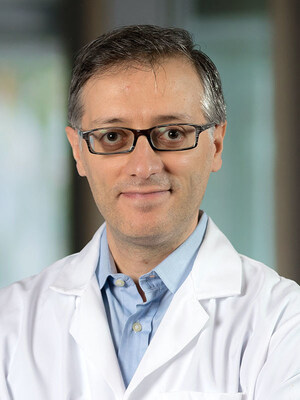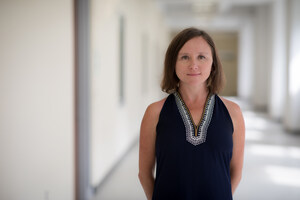BRONX, N.Y., Aug. 11, 2020 /PRNewswire/ -- Chemotherapy usually cures children diagnosed with acute lymphoblastic leukemia (ALL), but the treatment may hamper brain development and impact key cognitive functions including sensory processing, memory, and attention. Researchers at Albert Einstein College of Medicine, Children's Hospital at Montefiore (CHAM), and Rutgers Cancer Institute of New Jersey have received a five-year, $4.6 million grant from the National Institutes of Health (NIH) to determine how chemotherapy exerts its damaging effects on the brain. Their long-term objective is to use this information to develop protective interventions that can prevent permanent harm.
ALL is the most common cancer among children and teenagers in the United States. More than 3,000 new cases are reported annually, representing 20% of all cancers diagnosed in people under age 20. The standard treatment cures nearly 90% of children but requires two years of often intense chemotherapy.
"While the phenomenon of 'chemo brain' is widely acknowledged, we don't know enough about how it affects children's brain development—and how significant and long-lasting the effects are," said lead investigator Elyse Sussman, Ph.D., professor in the Dominick P. Purpura Department of Neuroscience and of otorhinolaryngology—head and neck surgery. "Our study will investigate how chemotherapy disrupts sensory processing, memory, and attention in children; where in the brain the damage is occurring; and whether there is a biomarker that can identify those who are most vulnerable. This is the first study of its kind to look at these details of cognition, brain development, and changes over time."
At Rutgers, the study will be led by Peter Cole, M.D., chief of pediatric hematology/oncology in the Hugs for Brady Foundation Pediatric Cancer Research Lab. Using an animal model, Dr. Cole has found that chemotherapy results in overstimulation of certain brain receptors, and has identified ways to block these receptors, protecting against the damage caused by chemotherapy. Last year, Dr. Sussman and Dr. Cole published a study characterizing the sensory, memory, and attention abilities in children who had survived ALL. Dr. Cole is also conducting studies at Rutgers on why some pediatric cancer survivors experience greater amounts of cognitive impairment than others and whether genes and environmental factors play a role in the variability.
"Children are susceptible to the damaging effects of cancer therapy because their brains continue to go through stages of structural change and development until young adulthood. By better understanding the impact of chemotherapy exposure at a biological level and determining the impact of that exposure on cognitive function in this population, clinicians can be better guided on how to individually tailor treatment to reduce toxicity. Our hope is that this will enable us to reduce or eliminate late effects of treatment that persist into the survivorship years," noted Dr. Cole, who is also the Embrace Kids Foundation Endowed Chair in Pediatric Hematology/Oncology at Rutgers Cancer Institute and professor of pediatrics at Rutgers Robert Wood Johnson Medical School.
The new study will include 240 children between the ages of five to 12 years old at Children's Hospital at Montefiore and the Rutgers Cancer Institute. The team at Einstein will work closely with Lisa Gennarini, M.D., director of hematologic malignancies at CHAM and assistant professor of pediatrics at Einstein. Children will be eligible if they have been finished with treatments for 12 months or more.
The researchers will study electrical activity in the brains of study participants during hearing tests and other cognitive assessments. "We plan to merge those results with functional magnetic resonance imaging (fMRI) aimed at showing the precise locations of brain activity during attention, memory, and sensory processing tests," said co-primary investigator Mark Wagshul, Ph.D., associate professor of radiology and of physiology and biophysics at Einstein.
The tests will be repeated a year later. The researchers hope to identify abnormal patterns of neuroconnectivity and learn how cognitive skills are affected in children who have received chemotherapy.
"Once we find out what is involved in the cognitive dysfunction caused by chemotherapy, we hope to develop treatment strategies to protect the most vulnerable children," said Dr. Sussman.
The grant, titled "Characterization of brain dysfunction during development in survivors of childhood acute lymphoblastic leukemia," was awarded by the National Cancer Institute, part of the NIH (1R01CA240360-01A1).
About Albert Einstein College of Medicine
Albert Einstein College of Medicine is one of the nation's premier centers for research, medical education and clinical investigation. During the 2019-20 academic year, Einstein is home to 724 M.D. students, 158 Ph.D. students, 106 students in the combined M.D./Ph.D. program, and 265 postdoctoral research fellows. The College of Medicine has more than 1,800 full-time faculty members located on the main campus and at its clinical affiliates. In 2019, Einstein received more than $178 million in awards from the National Institutes of Health (NIH). This includes the funding of major research centers at Einstein in aging, intellectual development disorders, diabetes, cancer, clinical and translational research, liver disease, and AIDS. Other areas where the College of Medicine is concentrating its efforts include developmental brain research, neuroscience, cardiac disease, and initiatives to reduce and eliminate ethnic and racial health disparities. Its partnership with Montefiore, the University Hospital and academic medical center for Einstein, advances clinical and translational research to accelerate the pace at which new discoveries become the treatments and therapies that benefit patients. Einstein runs one of the largest residency and fellowship training programs in the medical and dental professions in the United States through Montefiore and an affiliation network involving hospitals and medical centers in the Bronx, Brooklyn and on Long Island. For more information, please visit www.einstein.yu.edu, read our blog, follow us on Twitter, like us on Facebook, and view us on YouTube.
About Montefiore Health System
Montefiore Health System is one of New York's premier academic health systems and is a recognized leader in providing exceptional quality and personalized, accountable care to approximately three million people in communities across the Bronx, Westchester and the Hudson Valley. It is comprised of 10 hospitals, including the Children's Hospital at Montefiore, Burke Rehabilitation Hospital and close to 200 outpatient care sites. The advanced clinical and translational research at its' medical school, Albert Einstein College of Medicine, directly informs patient care and improves outcomes. From the Montefiore-Einstein Centers of Excellence in cancer, cardiology and vascular care, pediatrics, and transplantation, to its' preeminent school-based health program, Montefiore is a fully integrated healthcare delivery system providing coordinated, comprehensive care to patients and their families. For more information please visit www.montefiore.org. Follow us on Twitter and view us on Facebook and YouTube.
About Rutgers Cancer Institute of New Jersey
As New Jersey's only National Cancer Institute-designated Comprehensive Cancer Center, Rutgers Cancer Institute, along with its partner RWJBarnabas Health, offers the most advanced cancer treatment options including bone marrow transplantation, proton therapy, CAR T-cell therapy and complex robotic surgery. Along with clinical trials and novel therapeutics such as precision medicine and immunotherapy – many of which are not widely available – patients have access to these cutting-edge therapies at Rutgers Cancer Institute of New Jersey in New Brunswick, Rutgers Cancer Institute of New Jersey at University Hospital in Newark, as well as through RWJBarnabas Health facilities.
SOURCE Albert Einstein College of Medicine

Related Links
WANT YOUR COMPANY'S NEWS FEATURED ON PRNEWSWIRE.COM?
Newsrooms &
Influencers
Digital Media
Outlets
Journalists
Opted In






Share this article